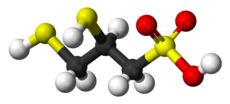| Revision as of 20:05, 11 October 2011 editCheMoBot (talk | contribs)Bots141,565 edits Updating {{chembox}} (no changed fields - added verified revid - updated 'DrugBank_Ref', 'UNII_Ref', 'ChEMBL_Ref') per Chem/Drugbox validation (report errors or bugs)← Previous edit | Revision as of 00:29, 29 November 2011 edit undoLmatt (talk | contribs)Extended confirmed users8,802 editsm clean up using AWBNext edit → | ||
| Line 86: | Line 86: | ||
| | issue = 1 | | issue = 1 | ||
| }}</ref> | }}</ref> | ||
| A 2008 study reported a case of ] (SJS), a potentially serious disease, in a child undergoing ] with DMPS; the SJS resolved gradually after the chelation therapy was stopped.<ref>{{cite journal |journal= Clin Toxicol (Phila) | |
A 2008 study reported a case of ] (SJS), a potentially serious disease, in a child undergoing ] with DMPS; the SJS resolved gradually after the chelation therapy was stopped.<ref>{{cite journal |journal= Clin Toxicol (Phila) |year=2008 |volume=46 |issue=5 |pages=479–81 |title= Stevens–Johnson syndrome in a child with chronic mercury exposure and 2,3-dimercaptopropane-1-sulfonate (DMPS) therapy |author= Van der Linde AA, Pillen S, Gerrits GP, Bouwes Bavinck JN |pmid=18568806 |doi= 10.1080/15563650701779687}}</ref> | ||
| ⚫ | ==References== | ||
| ⚫ | {{Reflist|2}} | ||
| ==See also== | ==See also== | ||
| Line 97: | Line 94: | ||
| * ] | * ] | ||
| * ] | * ] | ||
| ⚫ | ==References== | ||
| ⚫ | {{Reflist|2}} | ||
| {{Chelating agents}} | {{Chelating agents}} | ||
Revision as of 00:29, 29 November 2011
 | |
 | |
| Identifiers | |
|---|---|
| CAS Number | |
| 3D model (JSmol) | |
| ChEBI | |
| ChemSpider | |
| KEGG | |
| MeSH | Unithiol |
| PubChem CID | |
| CompTox Dashboard (EPA) | |
InChI
| |
SMILES
| |
| Properties | |
| Chemical formula | C3H8O3S3 |
| Molar mass | 188.289 g/mol |
| Except where otherwise noted, data are given for materials in their standard state (at 25 °C , 100 kPa).
| |
2,3-Dimercapto-1-propanesulfonic acid (abbreviated DMPS) and its sodium salt (known as Unithiol) are chelating agents that form complexes with various heavy metals. They are related to dimercaprol, which is another chelating agent.
The synthesis of DMPS was first reported in 1956 by Petrunkin from Kiev, Ukraine. The effects of DMPS on heavy metal poisoning, including with polonium-210, were investigated in the following years. DMPS was found to have some protective effect, prolonging the survival time.
A study was undertaken of DMPS use by workers involved in the production of a calomel skin bleaching lotion and in direct contact with mercurous chloride and that already showed elevated urine mercury levels. The sodium salt of DMPS was found to be effective in lowering the body burden of mercury and in decreasing the urinary mercury concentration to normal levels.
DMPS administrated to a mercury poisoned animal model failed to remove the mercury from tissues and reduce the inorganic mercury burden in the brain. A 2008 study reported a case of Stevens–Johnson syndrome (SJS), a potentially serious disease, in a child undergoing chelation therapy with DMPS; the SJS resolved gradually after the chelation therapy was stopped.
See also
References
- Aposhian, H.V. (1990). "Meso-2,3-dimercaptosuccinic acid: Chemical, pharmacological and toxicological properties of an orally effective metal chelating agent". Annual Review of Pharmacology and Toxicology. 30 (1): 279–306. doi:10.1146/annurev.pa.30.040190.001431. PMID 2160791.
{{cite journal}}: Unknown parameter|coauthors=ignored (|author=suggested) (help) - D. Gonzalez-Ramirez, M. Zuniga-Charles, A. Narro-Juarez, Y. Molina-Recio, K. M. Hurlbut, R. C. Dart and H. V. Aposhian (1 October 1998). "DMPS (2,3-Dimercaptopropane-1-sulfonate, Dimaval) Decreases the Body Burden of Mercury in Humans Exposed to Mercurous Chloride" (free full text). Journal of Pharmacology and Experimental Therapeutics. 287 (1): 8–12. PMID 9765315.
{{cite journal}}: CS1 maint: multiple names: authors list (link) - Rooney, James (2007). "The role of thiols, dithiols, nutritional factors and interacting ligands in the toxicology of mercury". Toxicology. 234 (3): 145–156. doi:10.1016/j.tox.2007.02.016. PMID 17408840.
- Guzzi, GianPaolo (2008). "Molecular mechanisms triggered by mercury". Toxicology. 244 (1): 1–12. doi:10.1016/j.tox.2007.11.002. PMID 18077077.
{{cite journal}}: Unknown parameter|coauthors=ignored (|author=suggested) (help) - Van der Linde AA, Pillen S, Gerrits GP, Bouwes Bavinck JN (2008). "Stevens–Johnson syndrome in a child with chronic mercury exposure and 2,3-dimercaptopropane-1-sulfonate (DMPS) therapy". Clin Toxicol (Phila). 46 (5): 479–81. doi:10.1080/15563650701779687. PMID 18568806.
{{cite journal}}: CS1 maint: multiple names: authors list (link)
| Chelating agents / chelation therapy (V03AC, others) | |
|---|---|
| Copper | |
| Iron | |
| Lead | |
| Thallium | |
| Other | |
| |